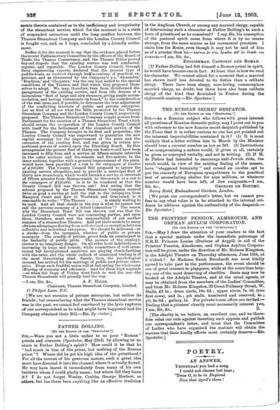FATHER DOLLING.
[To THE EDITOR OP THE "SPECTATOR-°] SIR,—Were you not a little unfair to us poor " Roman " priests and converts (Spectator, May 23rd) by allowing us no share in Father Dolling's spirit ? How could it be that he "had much in him of the priest, but nothing of the Roman priest" P Where did he get his high idea of the priesthood ? For all the torrent of his generous nature, such a great idea must have directed it into the channel where it actually flowed. He may have learnt it immediately from many of his own brethren whom I could gladly name ; but where did they learn it ? I do not forget Wesley, Crabbe, George Herbert, or others, but has there been anything like an effective tradition
in the Anglican Church, or among any married clergy, capable of determining such a character as Father Dolling's to such a form of priesthood as he conceived ? I say, Sir, his conception of the pastoral spirit came from where it is by no means strange, from the same source as his ceremonial practices. I claim him for Rome, even though it may not be said of him
as of a greater than he,— Mai% Ep (ZY vios, gt.tahm LI. brat& 1-nr ii-gazoiy.-1 am, Sir, &c., ENGLISHMAN, CATHOLIC AND ROMAN.
[If Father Dolling had felt himself a Roman priest in spirit, he would have become one in fact. At least, that is how we read his character. We cannot admit for a moment that a married has shown itself less devoted to its duties than a celibate clergy. There have been sleepy, ease-loving, commonplace married clergy, no doubt, but there have also been celibate clergy of the kind that flourished in France during the eighteenth century.—ED. Spectator.]










































 Previous page
Previous page